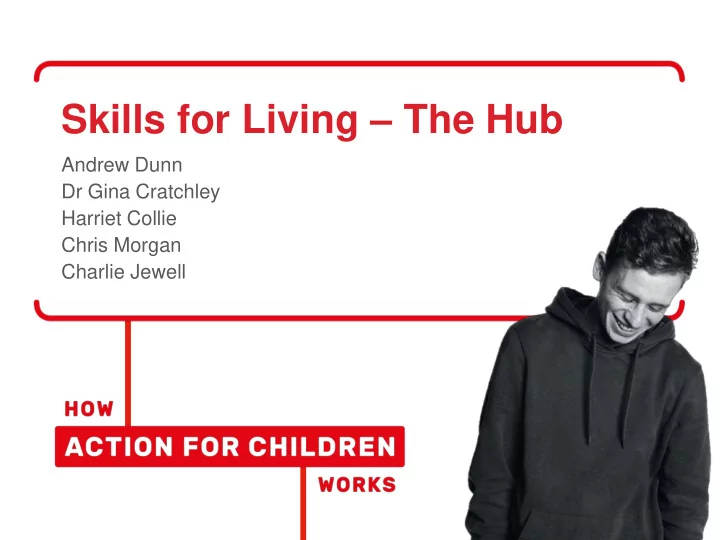

Skills for Living – The Hub Andrew Dunn Dr Gina Cratchley Harriet Collie Chris Morgan Charlie Jewell
Skills for Living – The Hub • Skills for Living is designed to improve the psychological well-being of young people leaving care • It offers young care leavers the opportunity to participate in a structured programme of psychosocial skills development using Dialectical Behaviour Therapy (DBT) as its primary intervention • The project covers the 3 Boroughs of Gwent: Caerphilly, Torfaen and Newport
Skills for Living Team Structure Jennie Welham Children’s services Manager Andrew Dunn Georgina Cratchley Practice Team Clinical Leader Psychologist Charlotte Jewell Cariad Mahoney Christopher Morgan Harriet Collie Assistant Clinical Young Person's Young Person's Team Leader Psychologist Practitioner Administration Practitioner
Dialectical Behaviour Therapy • DBT is a therapy that was developed by Marsha Linehan as a means of working with individuals with a diagnosis of Borderline Personality Disorder • Over the years it has been used with people who display high risk taking behaviour regardless of their diagnosis • Our DBT intervention model has been adapted for working with young care leavers aged 16-24 years old • It provides a hierarchical approach to working with individuals who present with unpredictable mood, self- destructive behaviours and unrelenting crises
What we aim to achieve • To help young people begin to understand difficult early experiences which can often leave them with conflicting, confusing thoughts and behaviours • To target high risk behaviours • To understand emotions and how to cope when emotionally distressed • To manage important significant relationships when distressed • To ask for their needs to be met • To keep their self respect
Service Delivery Continued Significant Weekly individual other Work sessions with young people Engagement phase Continued Training and Young people will Consultations to continue to be professionals psychometrically tested DBT informed Group- pre/post group and then at a 6 month follow up. work phase On completion of core intervention – young person will be assigned a Strand / Community pathway
Ingredients of DBT • Value the therapeutic relationship (attachment model) • Use of validation • Dialectic of change verses acceptance • Helping the young person • Willingness verses wilfulness
The Psychosocial Skills Modules • Mindfulness • Distress Tolerance • Emotion Regulation • Interpersonal Effectiveness
Mindfulness • Capacity to pay attention, non-judgementally to the present moment • Experiencing one’s emotions and senses fully yet with perspective • Why is it useful for young people? o It helps to increase awareness of inner experiences …but not get lost in them o o Helps to increase sense of control of mind rather than mind controlling you o Helps to accept and tolerate powerful emotions o Creates self awareness of body and mind connection o Mindfulness helps bring down levels of emotional arousal
Distress Tolerance • Distress tolerance skills teach young people to cope with pain and distress in a healthy way so that it doesn’t lead to long term suffering • The skills allow young people the time and emotional space to make decisions from wise mind about whether and how to take action, rather than falling into intense, desperate and often destructive emotional reactions • This is achieved through the development of distraction techniques and relaxation / being kind to yourself strategies
Emotion Regulation • Focuses on enhancing control of emotions, not just surviving them • Helps young people to identify and label emotions • Helps reduce vulnerability to emotional mind • Increases the likelihood of positive emotions through pleasant events and mastery
Interpersonal Effectiveness • To manage relationships and help to keep yourself safe • Looking at how much are you asking for • What is your Objective? • Can other people meet your needs? • Are you able to meet others needs? • How important is this relationship? • Keeping self-respect • Strategies for asking for what you need (or want); strategies for saying ‘no’, and coping with conflict.
Mindfulness Exercise
Young Person Q & A
Recommend
More recommend